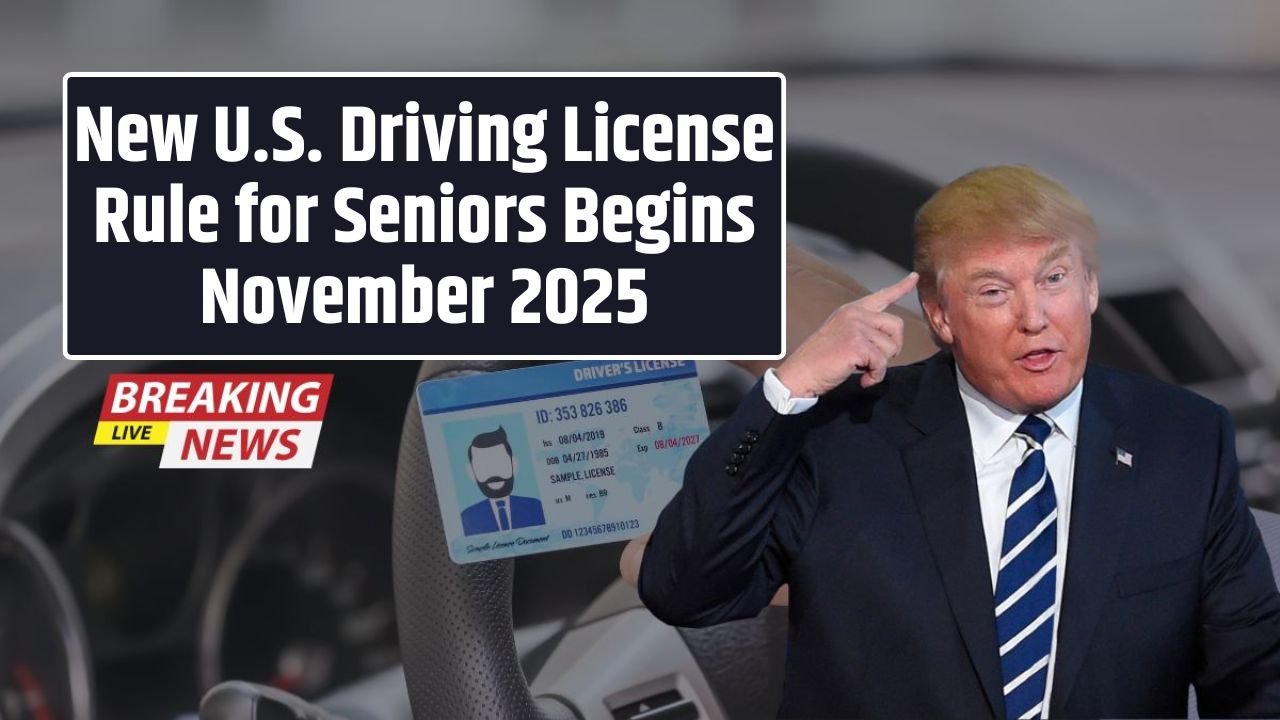New U.S. Driving License Rule for Seniors :- Starting in November 2025, a new rule will go into effect that impacts senior drivers across the United States. This new regulation aims to improve road safety and ensure that older drivers are fit to operate vehicles safely. If you’re a senior driver, or if you have a loved one who is, here’s what you need to know about the upcoming changes.
What Is the New U.S. Driving License Rule for Seniors?
The new rule requires seniors—typically those aged 70 and older—to undergo more frequent driving tests and medical evaluations when renewing their driver’s licenses. This is part of an effort to address concerns about the impact of aging on driving abilities, such as slower reflexes, diminished vision, and other health conditions that can affect safe driving.
Currently, seniors in most states can renew their driver’s licenses through simple paperwork, often without having to take a driving test or medical checkup. However, the new rule will introduce stricter requirements to ensure that older drivers are still capable of navigating the roads safely.
Key Changes to Expect
-
Increased Renewal Frequency:
In many states, seniors will need to renew their driver’s licenses more frequently after turning 70. For example, instead of renewing every 4 or 8 years, they may have to renew every 2 or 3 years. This change is meant to keep up with any age-related health issues that might affect driving abilities. -
Mandatory Vision and Medical Exams:
Seniors may be required to provide proof of a recent eye exam and, in some cases, a medical evaluation. These exams will check for common age-related conditions such as cataracts, glaucoma, or other vision impairments that could make driving dangerous. -
Driving Tests for Some Seniors:
Some seniors may be asked to take a road test when renewing their license. This is more likely if there are concerns about their ability to drive safely, whether due to medical conditions, poor driving history, or changes in cognitive abilities. A driving test ensures that seniors can still perform basic driving tasks, like turning, stopping, and navigating traffic. -
State-Specific Requirements:
The exact rules will vary by state. While all states must comply with the federal guidelines, individual states may have their own additional regulations. It’s important for senior drivers to check with their local Department of Motor Vehicles (DMV) for the specific rules that will apply in their area.
$2,000 Federal Direct Deposit Arriving This November 2025 – Check If You’re Eligible!
Why Is This Rule Being Implemented?
As the U.S. population continues to age, there are growing concerns about older drivers on the road. According to the Centers for Disease Control and Prevention (CDC), older adults are more likely to be involved in traffic accidents due to issues like slower reaction times, medical conditions, and the effects of aging. The new rule aims to reduce accidents, injuries, and fatalities by ensuring that older drivers are physically and mentally fit to drive.
Additionally, by requiring more frequent evaluations, the rule helps catch any health problems that may not be immediately apparent. For example, a senior might not notice a decline in their vision or might not be aware of changes in their reflexes until they’re tested.
2026 Tax Changes: Higher Standard Deduction and $6,000 Senior Bonus Extended
How Will This Impact Seniors?
While some seniors may find the new requirements inconvenient, the goal is to make roads safer for everyone. Many older drivers are highly skilled and cautious behind the wheel, but health issues can sometimes go unnoticed. These new rules provide an opportunity for seniors to stay informed about their own driving abilities and to take necessary precautions if their health changes.
What Should Seniors Do Now?
If you or a loved one is a senior driver, here are a few things you can do now to prepare for the upcoming rule changes:
-
Stay on top of health checkups: Regular medical exams, including eye tests and physical exams, can help identify any potential issues that may affect driving.
-
Check your state’s requirements: Rules vary by state, so make sure to check with your local DMV for the specific details regarding senior driver’s license renewals.
-
Consider taking a driving course: Some states offer refresher courses for older drivers. These courses can help you stay up-to-date with the latest road rules and improve your driving skills.
-
Talk to your doctor: If you have health concerns that could affect your ability to drive safely, such as vision problems, dementia, or mobility issues, it’s a good idea to have a conversation with your doctor about alternatives to driving.
Conclusion
The new U.S. driving license rule for seniors, beginning in November 2025, is designed to enhance road safety and ensure that older drivers are fit to drive. While this might mean more frequent tests and evaluations for some seniors, it is ultimately about protecting the health and safety of all drivers on the road. By staying informed and proactive about their health and renewal requirements, senior drivers can continue to enjoy their independence while helping make the roads safer for everyone.
Yellowstone 1944 Trailer (2026) – Spencer, Elizabeth, and the War for the Dutton Legacy
FAQs Of the New U.S. Driving License Rule for Seniors
1. What is the new U.S. driving license rule for seniors?
Seniors aged 70+ will need more frequent renewals, medical exams, and possibly driving tests starting November 2025.
2. Why is this rule being implemented?
The rule ensures older drivers are fit to drive safely by addressing age-related health issues.
3. Who will be affected by the new rule?
Seniors aged 70 and older will be impacted, though specifics vary by state.
4. Will seniors have to take a driving test?
Some seniors may need to take a road test if there are concerns about their driving ability.
5. How often will seniors need to renew their licenses?
Seniors may need to renew every 2-3 years instead of the usual 4-8 years.





